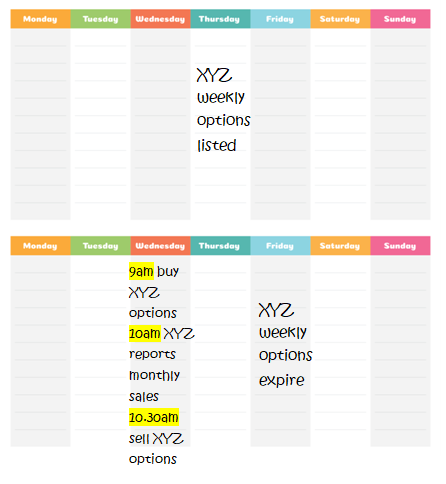
TRADER’S TRIO SPECIAL
(BETTER THAN A BAKER’S DOZEN!)
BUY THREE MONTHS OF WEEKLY OPTIONS TRADING MEMBERSHIP FOR $357 AND GET A FOURTH MONTH FREE!
Search this site:
DAY TRADING WEEKLY OPTIONS
by Amanda Harvey
Day trading weekly options is an excellent way of implementing the use of weekly options. Due to the short duration of weekly options, they are ideally suited to a style of trading that centers around entering and exiting each trade quickly. According to the U.S. Securities and Exchange Commission, a “day trade” is defined as the purchase and sale, or the sale and purchase, of the same security on the same day in a margin account.

One of the biggest advantages of day trading weekly options as opposed to day trading monthly options is that the premiums of weekly options are generally lower than their monthly counterparts. The primary reason for this is that there is less time-value built into the costing of a weekly option, and as a day trader does not need extra time, they don’t need to pay the higher premium for a longer period until expiration.
CATALYSTS FOR DAY TRADING WEEKLY OPTIONS
Another reason that weekly options are excellent for day trading is that the criteria considered in selecting a weekly option to trade is the same as the criteria for choosing an option to day trade. In both these trading scenarios, the most important aspect to consider is whether there is valid reason to believe that a stock price and its corresponding option price is likely to move fast and significantly. This anticipated catalyst may include the company reporting earnings, or major financial news, the release of a new product, or changes in the company structure or key personnel.
When day trading weekly options, a trader can enter a trade that is expected to rise dramatically (in the case of a call option), or to drop hard and fast in the case of a put option, and exit the trade immediately after that movement has occurred.
OTHER FACtors to consider
Volatility is a key factor that affects the suitability of an option for day trading. Historical volatility measures the amount of fluctuation in price that a security has previously demonstrated. If a stock is generally fairly slow-moving, even a dramatic catalyst may not cause the price to jump substantially enough to make the option viable for a quick profit. However, the implied volatility, or predicted future volatility, may be higher than the historical volatility, making the option a potentially profitable trade.
Volume is another very important aspect to evaluate when day trading weekly options. Sufficient volume is vital in trading any options, and especially when the goal is to enter and exit the trade within the same trading day. If there is not enough trading volume, then a trader will likely be unable to sell their option contract for the price they want within their time-frame, regardless of the value of the contract.
STRATEGY FOR day trading WEEKLY OPTIONS
When determining your exit strategy, one of the biggest considerations is your risk tolerance. With our trading alerts, we aim for 100% profit, but this is just a suggestion. Whether a trader is satisfied with a quick 30% or prefers to hold out for maximum profit, the choice is an individual one.
Once you have sold your position, and exited the trade, there are some further strategies you can apply if you believe that the price has the potential to keep moving in the direction of your choice (up for a call or down for a put). These strategies are based on the price movement at that time.
One possibility is that the price drops back after you have sold your option contract. If you have reason to believe that it will rebound again, it can be a great opportunity to buy the same option again, and make a second profit, assuming that the price behaves as you expect.
The other situation is that the price continues to move in the direction of the position you have just sold, and because the catalyst is still in place, you are fairly sure that it should continue moving that way. You could then choose to buy another contract with a higher strike price in anticipation of making another profit from the continued movement, while having already secured your initial profit. Ian Harvey sometimes enters and exits the same option several times within a day, and it works well for him.
A FINAL WORD ON day trading WEEKLY OPTIONS
Day trading weekly options can be a fast-paced way to profit from trading stock options if you have the right information, and the ability to make quick and rational trading choices.
However, neither day trading nor trading weekly options is very well suited to a novice trader, and all trading carries an element of risk that a trader must be aware of and willing to accept.
Recent Articles
-
Weekly Option Trade Results
The results from recent trades offered through our membership service are listed on this page. -
Amazon Weekly Option Trade Delivers 318% Gain as Analysts Turn Bullish
Amazon.com, Inc. (NASDAQ: AMZN): Weekly Options Trade Delivers 318% Gain as Analysts Turn Even More Bullish -
Affirm Options Trade Soars 103% in 3 Days as Analysts Turn Bullish
Affirm stock surged after strong earnings, with a Weekly Options USA trade gaining 103% in 3 days as analysts raised price targets.
Back to Weekly Options USA Home Page from Day Trading Weekly Options



